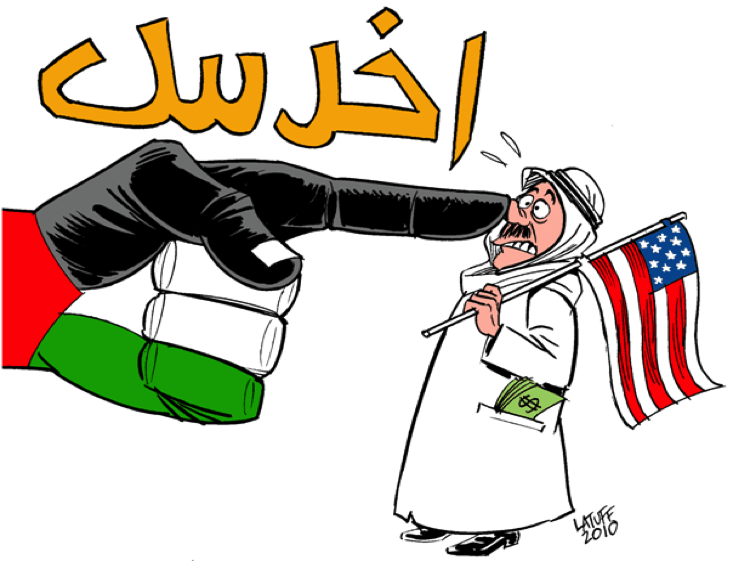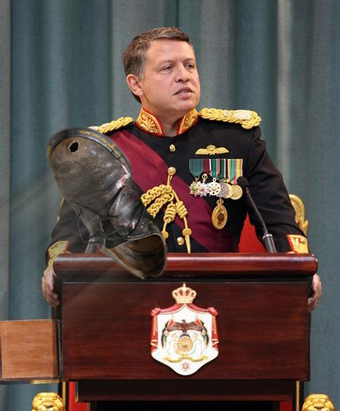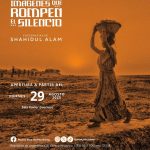By rahnuma ahmed

Ikhras, the Arabic word for “shut up”, is the name of a website http://ikhras.com/ which nominates a House Arab or a House Muslim every month, for having earned the glory of receiving the hurled at shoe, so that he does… well, precisely that. Shuts up.
Exactly what Muntadhar al-Zaidi had done to former US president George W. Bush Jr to get him to Ikhras!
Bush, while on his fourth visit to Iraq as the sitting president, was addressing a press conference at the prime minister’s palace in Baghdad (December 14, 2008). He spoke of having built “a freer, safer, and more hopeful world.” Of having shown the people in the Middle East that “America stands firmly for liberty and justice and peace.” Of having ensured that the next US president would inherit a “stable foundation for the future.”?Whoosh. “This is a farewell kiss from the Iraqi people, you dog,” al-Zaidi yelled, as he flung the first shoe.
The second followed, within split seconds. “This is for the widows and orphans and all those killed in Iraq.”
But Ikhras’ monthly shoe awards, as its mission statement pronounces,? is not for white oppressors but for House Arabs and House Muslims. Its editors draw on Malcolm X, Black American revolutionary leader, who, in these memorable words had distinguished between Field Negroes and House Negroes in a powerful speech in 1964 (the video has been uploaded on Ikhras’ website):
“Back during slavery, when Black people like me talked to the slaves, they didn’t kill ’em, they sent some old house Negro along behind him to undo what he said. You have to read the history of slavery to understand this. There were two kinds of Negroes. There was that old house Negro and the field Negro.? The house Negro always looked out for his master. When the field Negroes got too much out of line, he held them back in check. He put them back on the plantation. The house Negro lived better than the field Negro. He ate better, he dressed better, and he lived in a better house. He ate the same food as his master and wore his same clothes. And he could talk just like his master — good diction. And he loved his master more than his master loved himself. If the master got hurt, he’d say: “What’s the matter, boss, we sick?” When the master’s house caught afire, he’d try and put out the fire. He didn’t want his master’s house burnt. He never wanted his master’s property threatened. And he was more defensive of it than his master was. That was the house Negro.
“But then you had some field Negroes, who lived in huts, had nothing to lose. They wore the worst kind of clothes. They ate the worst food. And they caught hell. They felt the sting of the lash. They hated this land. If the master got sick, they’d pray that the master’d die. If the master’s house caught afire, they’d pray for a strong wind to come along. This was the difference between the two. And today you still have house Negroes and field Negroes.”
A slight pause, before Malcolm declares, “I’m a field Negro.”
While historians might disagree with his portrait of plantations, writes black political scientist Manning Marable — for most American slaves worked on farms with less than twenty Blacks, there were far lesser large plantations in the US in comparison to those existing in pre-revolutionary San Domingue, Bahia or Pernambuco, the separation of Black house servants from field hands was socially and materially insignificant? in American plantations — the “strength of Malcolm’s commentary is essentially ideological and political.” (How Capitalism Underdeveloped Black America: Problems in Race, Political Economy and Society, 1983).
Harry Belafonte had used the same metaphor in October 2002 for former secretary of state Colin Powell. A House Negro. Plantations still exist, insisted Belafonte while the furore over his remarks raged, they exist all over America. Walk into South Central Los Angeles, into Watts, into Over-the-Rhine in Cincinnati, you will find people living “lives that are as degrading as anything that slavery had ever produced.” He had nothing personal against Powell, he said, it was the policy of the administration that Powell served. “Where is Colin Powell’s conscience? In a time when the world is getting ready to go up in flames in a war that’s hugely ill-advised…Today we are going to go after Iraq…where do we go next? After Iran? And then, when our present friends fall out of favor with us, do we go after Pakistan?” (CNN Larry King Live: Interview with Harry Belafonte, October 15, 2002).??Even the dimwitted will now be forced to agree that Belafonte was not off the mark.
Condoleeza Rice as well, said Belafonte, she was “absolutely” nothing else but a House Negro.
They had been “permitted to come into the house of the master.”? They ate the same food, wore the same clothes, talked just like the master. They loved the master more than he loved himself. “What’s the matter, boss, we sick?”
Present day House Negroes, points out a blogger who writes under the name fieldnegro, move to white suburbia “not for better schools, safer neighbourhoods, and cost effectiveness” but because they “want to be around [the] massa [master] and his house.”
Ikhras would not have been created if a small minority of Arabs and Muslims, claiming to “represent” us, had not “hijacked our identities and name for their own self-aggrandizement and in furtherance of personal ambitions unrelated to our communities? agenda, interests, and well-being.” It was their “collaboration” which necessitated the birth of Ikhras.
For, instead of condemning US war crimes and warmongering abroad, instead of being front-liners in the anti-War movement, these “cowardly”, “groveling”, “kowtowing”, “opportunistic” and “unprincipled” Arabs and Muslims — desperate for the massa’s “approval and validation” — are providing a “veil of political legitimacy to the ruling class and foreign policy makers that victimize the people they claim to represent.”
This small minority, members of the mythical ‘Arab Lobby’, are eager to demonstrate their loyalty at every opportunity, to overcompensate for their apparent minority status by “immers[ing] themselves in American political folklore complete with the flag-waving, sloganeering, and transparently phony expressions of patriotism.” They are pre-occupied with “garnering support among the corporate, news-entertainment industry,? and engaging in that never ending quest for acceptance among the power elite ”
These House Arabs and Muslims are a “blight” and a “hindrance”, as they are detrimental to increasing our understanding and to deepening the ties of solidarity among US citizens (Arabs and Muslims, and others), and among the citizens of the world.
To make matters worse, says Ikhras, many of them assist in the occupation of Iraq and Afghanistan through “translation services, military recruitment, and other forms of quisling-type collaboration.” Thereby performing a disservice to the homes that they have left behind, and the new one that they have adopted.
Ikhras, say Qasim Lutfi and Thabit Al-Arabi, the website’s editors, is a “modest tribute to brave Field Arabs who dig tunnels in Gaza to feed their families, throw shoes at their oppressors, and stand up for their people, civilizations, and universal values such as freedom, social justice, and human rights despite overwhelming odds.”
Ikhras supports activism that is not ethno-centric, not restricted to the US, one that “include[s] men, women and children across all religious, ethnic, and class divisions and national borders” and works for progressive change, both within the US and in the world at large. Ikhras’ perspective is global, it is internationalist. This is elaborated in an answer to one of the questions in the website’s FAQ (Frequently Asked Questions).? ?”If you hate America so much, why are you here?” The editors reply, “[L]iving here is our first choice. As the great revolutionary Che Guevara once said ?I envy you. You North Americans are very lucky. You are fighting the most important fight of all ? you live in the heart of the beast.?
Since the oppressed in the Arab world are the “victims of the alliance between Arab tyranny and US Imperialism”, Ikhras is committed to exposing, ridiculing and holding accountable the “Arab and Muslim arms of the US empire.” To not play it safe by defending civil liberties or working towards peace in the Middle East because “doing some good work” cannot be a licence for contemptible behaviour, when a clear nexus exists between “US foreign policy, and the Washington-backed autocracies and dictatorships which underpin American imperialism in the Middle East.” Nothing short of the defeat of the colonial project of Israel, the liberation of Palestine from the river to the sea, the return of true owners to their homes, an immediate end to the foreign US military occupation of Iraq and Afghanistan, the withdrawal of local American-installed puppets, the removal of all US bases, the end of US military presence in the Middle East, the immediate arrest and handing over of war criminals to the proper International Court, paying reparations, issuing a public apology, a declaration that the US will never invade or meddle in the internal affairs of any other country — will do.
A prime example of a House Arab is King Abdullah II of the Hashemite Kingdom of Jordan, Ikhras was pleased to announce him the winner of the Muntadhar Zaidi Shoe of the Month Award for November, 2011.
Adullah’s qualifications are many: he went overdrive in November to remind the world of being Zionism’s best friend in the Arab world (hosted war criminal Shimon Peres in Jordan, held “warm and friendly” meetings, no mention of the Gaza blockade, home demolitions, detentions and political prisoners), of his family having served as a pliant tool of Western imperialism, of presently being tasked with leading the Arab counter-revolution. The latter role was played to perfection when he called on the Syrian President Bashar Al-Assad to “step down,” symbolically forfeiting thereby the right of ?the Syrian people to determine this, for it is not up to King Abdullah or “his masters in Washington” to decide. Ironically, Abdullah has forgotten that the borders of historic Syria encompasses his own artificial Kingdom which was carved out by the French and British colonisers. Hence, Ikhras writes, “In Syria, it may be possible to question the legitimacy of the regime, but in Jordan it is the legitimacy of the state itself that?s in question.”
Abdullah’s strenuous efforts to remind his Western masters of his loyalty and? importance simultaneously express an undercurrent of fear, that “the US and Israel may render his regime dispensable in the future.”

Are there House Bangladeshis too? Or, to re-create it in our context, are there in addition to 1971 rajakars (collaborators, accused of war crimes), also imperialist ones? In other words, Imperialist Rajakars? Who, in the interests of self-aggrandizement and furtherance of their personal ambitions, do not condemn US war crimes and warmongering, confining it artificially to ‘the nation’ in a global world, so as not to upset the massa’s apple cart? So that they can eat better, dress better, live in better houses? So that they can keep talking just like the master, with good diction?
The only reply to which can be Ikhras! Chup kor! Whoosh!
Published in New Age, Monday, February 20, 2012
Related articles:
By Any Means Necessary
We teach life sir





Leave a Reply
You must be logged in to post a comment.